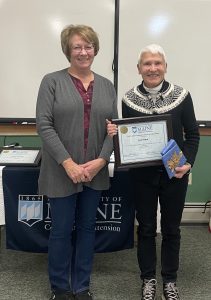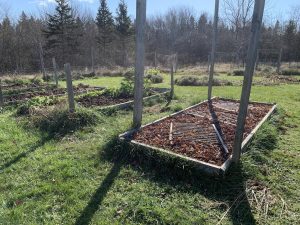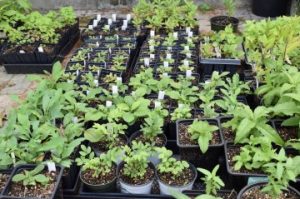Master Gardener Volunteers Newsletter – Hancock County – January 2024
Table of Contents
GETTING TO KNOW MG ADVISORY / MEET JANE HAM / MEET JOHN MCCLEMENT / KYRA ALEX – THE GARDEN PROJECT/ NATIVE PLANT SEED SOWING
Upcoming Dates to Remember!
Jan 15 – Extension Office Closed – HOLIDAY
Jan 19 – Winter Seed Sowing Workshop – Bangor
Feb 5 – MG Advisory Meeting
Feb 19 – Extension Office Closed – HOLIDAY
GETTING TO KNOW OUR MGV ADVISORY MEMBERS!
Happy 2024!
This month we’d like to begin introducing you to the Master Gardener Volunteer Advisory Committee (MGVAC). In each issue, we will profile at least two members of the Committee so you can get to know us and what we do. This month we begin with this year’s co-chairs, Jane Ham and John McClement. Every year we have two co-chairs, and two co-co-chairs who will become chairs the following year. The terms for all members are three years, with an option to renew for a fourth. Members who rotate out are eligible to return after one or more years. This year there are 14 members who live in Blue Hill, Brooklin, Castine, Corea, Deer Isle, Lamoine, Seal Cove, Sedgwick, Surry, and West Tremont. Our primary job is to support the program; this involves a lot of liaison work with the University; the heads of all the Volunteer projects; and Sue Baez at the Extension Office, without whom very little would get done. Every Committee member volunteers to work on at least one sub-committee, and most of us volunteer in the gardens as well.
This month we also have a wonderful article about Kyra Alex’s Garden Project in Deer Isle. Please keep in mind that we are always looking for interesting topics for this newsletter, either written by you or suggested to us by you. Let your voice be heard!
Many thanks to all of you who took the time to respond to the survey. You’ll be hearing more about it in future issues.
MENTORS: TEACHERS AND FRIENDS
Getting to know Jane Ham
I was in the Master Gardener COVID Class. We started the course in the classroom, touching specimens, and interacting with fellow students, presenters, and helpers. We were eager learners of all the material. Then in late March 2020, the world shut down. I spent every Friday morning from then on to the end of the course on my couch trying to pay attention to powerpoint presentations. I don’t sit much so it was a challenge, as was mastering the MGV course work. I finally called Marjorie Peronto, MGV Coordinator, confessing my struggles. She offered moral support and encouragement. By fall of 2020, we were allowed back into the gardens to start our internships. I worked with Marjorie in the Extension Gardens. She was patient, kind and so knowledgeable, a true friend and mentor. I have been fortunate to work in 4 community gardens in Ellsworth. I’m no expert, but I’m an enthusiastic volunteer gardener. I think the work we do in growing food for the food pantries and other programs throughout Hancock and Washington Counties is vital in the struggle to end food insecurity. I get enormous satisfaction in the small part I play in this effort. A side benefit has been the new friends made doing this work.
There are master gardeners out there who have stepped away from volunteer work. I’m calling on you to get back in the game. Our community gardens need help. You have expertise and could mentor new MGVs. Perhaps you are a recent MGV and could benefit from working alongside an experienced MGV. We can connect you with a mentor. If you want to locate a garden near where you live, or connect with a mentor, call or email Sue Baez, at the Extension office, 667-8212, sue.baez@maine.edu.
Think about it over the winter. See you in the gardens!
Jane Ham, Co-Chair, MGV Advisory Committee
**************************************************************
Speaking of Jane Ham! Did you know?
Jane Ham was recently presented with the Annette Valenoti Leadership In Action Award. This award is presented by the Hancock County Extension Association each year at their regular Annual Meeting, to a deserving Extension Volunteer who goes above and beyond with their volunteer commitment to Extension. Annette Valenoti was a highly-valued member of our Extension family, who passed away in 2008. She served for many years as a local and state leader for the Maine Extension Homemakers, and served on the Hancock County Extension Association board for numerous terms.
We were truly honored to present Jane with this wonderful award. Some highlights of her award included her past (pre-extension) volunteer service, her involvement in many of Hancock County MG projects, and her numerous volunteer hours in such a short time, 315+ volunteer hours in a short 3 years. Jane was a member of the “Covid Class”. sticking with us as the class went from in-person to online for the first time! That’s dedication!
Thank you Jane Ham for all you do!
Sue Baez
THE ROAD TO MGV
(Or How I Discovered Dirt Under My Nails Was A Good Thing…)
Getting to know John McClement

I have spent the last 25 years in an around the wine business. For over 20 of those years, I lived and worked in New York City and experienced wineries throughout the world as part of my job. I spent a lot of time in vineyards and learned a tremendous amount about grape varieties, locations, growing conditions, soils, climate, disease etc., etc. I loved it.
About 10 years ago my son Kip was graduating from high school and wanted to postpone college with a gap year. Kip had developed an interest in farming and had worked on various farms during summer vacations. We also discovered Wwoofing (World Wide Opportunities On Organic Farms), where there were fantastic chances to experience farm life throughout the world. Kip initially chose New Zealand and the experience led to 2 years of working on farms and vineyards all over the globe.
Kip wanted to farm and on a Thanksgiving holiday trip to a house on the Chesapeake Bay we drove by miles and miles of black dirt former tobacco fields which piqued our interest. When we returned to our regular day-to-day (school for Kip, work for me), the possibility of finding a farm stuck with me as retirement was not out of the question and a new adventure was an enticing option. I started researching farms for sale. At the time, Maryland farms on the Eastern shore turned out to be huge and more corporate in nature so I next turned to Maine where I have spent a portion of my summers at our family house between Camden and Belfast for most of my life and Kip had worked on farms during summer vacations while in his teens.
This is where Maine Farmland Trust entered the picture. Google “Farms for sale in Maine” and up pops MFT’s website. Within minutes I had located a farm in Sedgwick on 22 acres of beautiful land with an authentic old cape set back from a country road.
Jackpot! We were ecstatic! We had been spending time on Little Deer Isle each summer for a number of years to “relax and rest up” after spending time with family across the bay and had grown to love the beauty and the off-the-beaten-path quality of the region.
Our excitement was short-lived when we discovered the property was about to go under contract. It was an estate sale and the proceeds were going to partially fund the purchase of a major tract of land for the benefit of the public through the Blue Hill Heritage Trust. A lot of steps were involved.
We were devastated but I just couldn’t let go of this opportunity and decided to contact the executor of the estate to ask to be considered as a back-up contract with no contingencies. Long story, short, the stars aligned and we got the property!
We closed in January of 2018 and Kip moved in full time and I started going back and forth between NYC and Sedgwick on a regular basis. By April of that year I realized that the undertaking was going to be too much for Kip to handle alone and, for me, New York was beginning to lose its luster. The farm was calling. By December of 2018, I was living here full time. Kip in the meantime had found love and decided to move to Farmington, ME which, in a year’s time, became Santa Fe, NM.
Sometime in the fall of 2018, the realities of owning a farm on my own were sinking in and I knew I needed an in-depth immersion into the world of plants. I applied and was invited to study with the 2019 class of MGV’s with Marjorie teaching us at the extension office. I loved it.
Also, at this time it became apparent that I had all the makings of a future hermit, so I decided to volunteer at the Blue Hill Co-op. Within weeks I had a part-time job that morphed into full-time running the Grocery Department. Two grueling years and a pandemic later I was able to extricate myself from running the day-to-day and focus on my old passion, wine, with the new addition of beer thrown in for good measure. I’m now known as the co-op wine guy.
My new role also allowed me more time for the farm and some volunteer work with MGV which has now landed me in the role of co-chair of the Advisory Committee for 2024.
I hope to get to know everyone involved throughout the MGV program. With the help of my spectacularly able co-chair, Jane Ham, and the rest of the committee we’ll strive to address the challenges ahead of us so the Hancock/Washington County Master Gardener Volunteer program continues to be the vitally important asset it is to our community and can grow in every sense of the word.
John McClement, Co-Chair, MGV Advisory Committee
KYRA ALEX – THE GARDEN PROJECT
By Wendy Lessard, MGV
Photos Courtesy of Kyra Alex
Kyra Alex is not a fellow MGV by training, but she is by heart. Kyra runs The Garden Project in Stonington. She gave a talk to MGV’s in Ellsworth this summer, and I interviewed her to get a deeper sense of some of her practices, vision, and habits of mind that have helped her create a thriving community-centered garden for people, plants, insects, and soil microbes.
The Garden Project sits on donated farmland that’s the site of the former town dump. Sounds counter-intuitive, but it’s the perfect place to be with an ethos of restoring the land. Now there are vegetable, herb, and pollinator flower beds, grapevines, fruit and nuts trees, and beehives. The before and after pictures show lush, massive diversity. Kyra and her fellow gardeners tend and continue to add to this edible landscape; their goal is that even 50 years from now, the land will continue to provide for people, animals, and insects even if “traditional gardening” is no longer happening.
beehives. The before and after pictures show lush, massive diversity. Kyra and her fellow gardeners tend and continue to add to this edible landscape; their goal is that even 50 years from now, the land will continue to provide for people, animals, and insects even if “traditional gardening” is no longer happening.
Raised beds grow more numerous, with soil health as the overarching vision. Each Fall, Kyra, volunteers, and her students add any needed amendments. It’s crucial to never leave soil bare. Seaweed is great for holding moisture, especially in early bed formation. This is important as the Garden Project “dry farms”, using no local well sources (important given recent local water supply issues), and catches water in rain barrels. A thin layer of wood chips and/or a layer of horse manure allows microbes to feed and keep erosion from happening. Chopped straw is used in the Spring/early gardening season to mulch for moisture, weed suppression, and to break down for even more soil health. And that’s “it”, a push in Spring and Fall, light weeding, and letting the resulting healthy soil work its “magic” on all that grows and the life it supports.
push in Spring and Fall, light weeding, and letting the resulting healthy soil work its “magic” on all that grows and the life it supports.
This leads to another guiding practice of keeping gardening from being so hard. As we can extend compassion to Nature so it can restore itself, we can extend compassion towards ourselves. We can let go of working so hard! It allows us more time to observe and listen to what the land and Nature tell us is needed. For instance, hauling discarded plants away from the garden for composting, then hauling the finished compost back, is a lot of unnecessary work. Thus, weeds that make it up through the layers are gently pulled and returned reverently on the garden beds to return their contents to the soil that grew them in the first place. Compost in place, work less, let the soil and nature do its work. Another instance: Kyra makes pesto from chickweed. Why not use what Nature gives (rather readily) and let go of working so hard on a planted, “non-volunteering”, crop.
I asked Kyra to describe her progression as a gardener. What came across lovingly and clearly was the land and Nature asks and guides, and she listens. Loving what she does creates abundance. For instance, their gardens needed a wind block given their site. Kyra observed their sloping fields and saw that grape vines would work. The wind keeps the bugs off and the vines create a wind break for the garden. The vines continue the edible landscape and provide multiple ways the students can use them.
and guides, and she listens. Loving what she does creates abundance. For instance, their gardens needed a wind block given their site. Kyra observed their sloping fields and saw that grape vines would work. The wind keeps the bugs off and the vines create a wind break for the garden. The vines continue the edible landscape and provide multiple ways the students can use them.
The land contained 200-year-old apple trees, from which the students made cider this year. Beehives have always been there, and Kyra is working to get a different mowing schedule for the fields that surround the garden for a more diverse and healthy insect population. Over the years of the project, they’ve added hazelnuts (bore this year), quince, plum, cherry, mulberry, elderberry, currants, berries, and other edible landscape specimens. It’s an interactive, reflective, and nurturing practice at The Garden Project, with an ethos of being a “tender”, not a “fixer”, and a rudder in the current of what Nature gives.
Some of the resources (beyond Nature) instrumental in Kyra’s evolution: The One-Straw Revolution – An Introduction to Natural Farming – Masanobu Fukuoka; Secrets of Soil: New Solutions for Restoring Our Planet – Peter Tompkins and Christopher Bird; and the work of Ruth Stout.
FMI on The Garden Project, or to volunteer or donate: https://thegardenprojectme.org.
What’s the latest on the Jumping Worm?
Here is the latest from Maine.gov
https://www.maine.gov/dacf/php/gotpests/othercritters/worms.htm
Looking for Workshops to participate in this winter? Visit our Extension Workshops site to see if something interests you.
How about the –
 Native Plant Winter Seed Sowing Make-and-Take Workshop – REGISTER HERE
Native Plant Winter Seed Sowing Make-and-Take Workshop – REGISTER HERE
Presented by University of Maine Cooperative Extension Horticulturist, Kate Garland.
When: Friday, January 19, 2024
Time: 4:00 p.m. – 4:45 p.m.
Location: Bangor Public Library, 145 Harlow Street, Bangor, Maine 04401
DO YOU KNOW
-Someone who inspires your gardening?
-Someone who is making a difference environmentally, food security, climate change mitigation – whether quietly
or loudly in one small plot or a large project?
IF SO
– We want to know, here is one way to tell us
MGVnewsletterinput@gmail.com
Our MGV newsletter is for and about Washington/Hancock MGV people, projects, and the community. MGVnewsletterinput@gmail.com, was established as a way for readers to recommend interesting topics or people for future articles, provide comments, or ask questions. It has been a little used resource, but for some of you, it has been a way to not only give input to the newsletter committee but also to make suggestions for Continuing Education and MGV projects. Try it!
This month’s newsletter sent by Sue includes articles from our new “Communicate with MGV’s” task force. We’d like the next edition to feature your suggestions and articles about gardeners and gardens. MGV’s, please contact us at MGVnewsletterinput@gmail.com with your ideas.
Thank you from
Betsy Adams, Jan M., Jane, Wendy, Linda, Mary D., Mary H., and Rita
